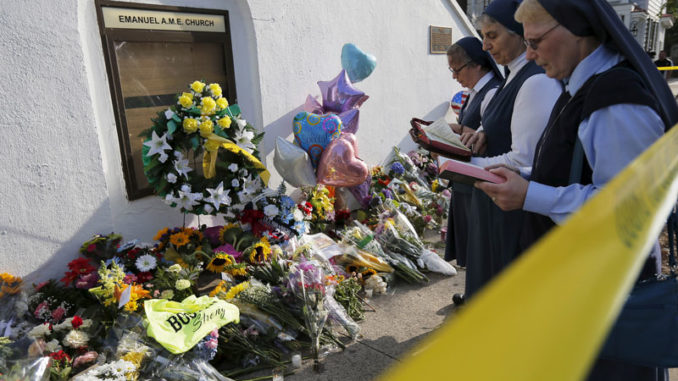
This June marks five years since the shootings at Mother Emanuel in Charleston. Around the state, a number of observances of this tragic anniversary are planned. In preparation, there have been ongoing gatherings focused on confronting the persistence of racism in our midst.
Our diocesan Office of Ethnic Ministries sponsors special activities every November (Black Catholic History Month) and February (Black History Month). Along with these special events, that office and the Office of Ecumenical and Interreligious Affairs promote ways to get people reading and talking.
Racism is an uncomfortable topic. We would like to think that, with slavery officially ended for more than 150 years and the Civil Rights Act put into law more than 55 years ago, we can just move on. However, anyone who looks around will encounter the persistence of racist images on our roadways and racist rants online. And then there are the news-making hate crimes. And edgy traffic stops.
Several years ago Bishop Edward Braxton came to Charleston for an Ethnic Ministries event and shared with those of us present how he had experienced racial profiling first hand. He, the Bishop of Belleville, Illinois, had been invited to the home of a prosperous white family. As he was driving to what was planned as a pleasant supper, he was stopped by local police for questioning. The inquiry boiled down to concern about why he was in such a nice neighborhood.
The Fellowship of Catholic Bishops in our state have invited churches to sponsor dialogues on the topic of racism. Beginning this January and February, groups in Rock Hill and Bluffton have taken up the challenge — the former on the book “Grace Will Lead Us Home,” a narrative of the Mother Emanuel shootings and their aftermath; the latter on the book “Trouble I’ve Seen,” which recounts some of the history of racism in America through the perspective of an African American preacher and professor. The Office of Ethnic Ministries also has groups reading and viewing “Just Mercy,” which deals with miscarriages of justice that have landed innocent African Americans in prison.
The South Carolina Christian Action Council this past October hosted the author of “Who Lynched Willie Earle?” and recounted the story of the tragic killing of a falsely accused teen from Greenville in 1947. On March 17, the council is hosting a seminar in Columbia on the abolition of the death penalty. The Catholic Church, under the leadership of Pope St. John Paul II, Pope Benedict XVI, and Pope Francis has taken an adamant stance against capital punishment, noting that there are reasonable alternatives and that those sentenced and executed tend repeatedly to be the poor and members of racial and ethnic minorities. So we are joining this discussion too.
There is a dismissive saying that talk is cheap. But refusing to talk about the roots of hatred, prejudice, and injustice perpetuates sins and crimes. Jewish ethicist and spiritual writer Pinchas Lapide once said of St. Francis of Assisi that the saint was a genius at what Lapide called “a spirituality of small steps.” The idea is that every one of us can make a difference in the small circles in which we travel simply by widening those circles. Sometimes all it takes is sitting in a church or a parish hall listening, talking with others, and asking, concretely, how we can do better.

